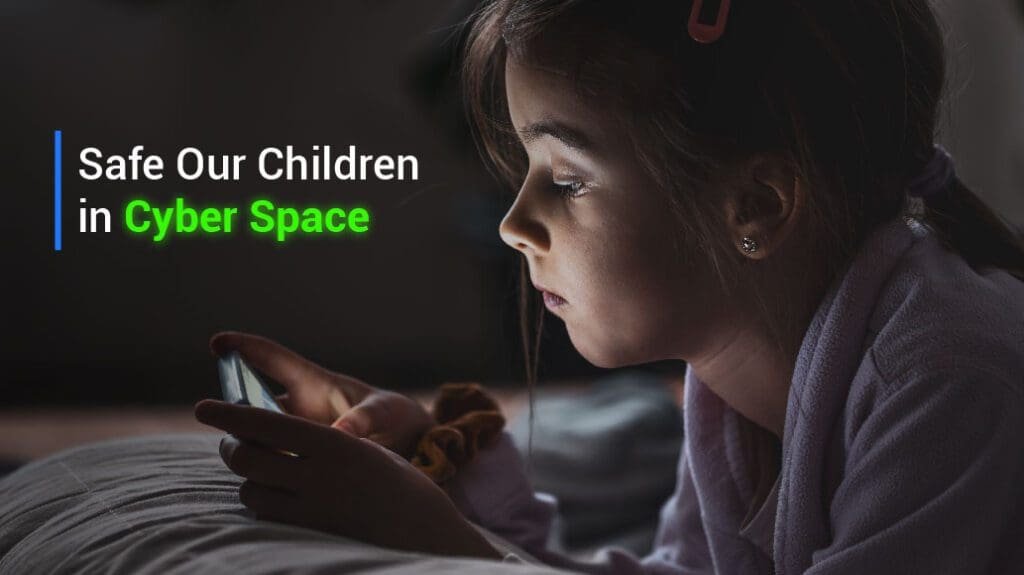How to Safe Children in Cyberspace

Now Cyber threats are increasing. Always keep children safe in cyberspace so parents must take care of it and communicate with them about the dangers of the internet. And it is the responsibility of parents or guardians.
Teach them how to identify or avoid risky situations. Educate them about the dangerous situation. Then must restrict them from chatting with strangers and sharing personal information. And establish some rules and restrictions for your children’s online activities. And regularly monitoring your children’s online activity can help you to avoid issues early. One of the parents’ duties is to protect their children from the dangers of the internet while still allowing them to enjoy the benefits of technology.
Safety for Students in Cyberspace
In today’s digital world students must be aware of the dangerous situations in cyberspace. Students should be cautious about sharing personal information such as names, places, addresses, passwords, and phone numbers.
Once something is posted, it will be seen by the public. So we must think and check before posting anything online. And use strong passwords; never share the passwords with anyone. Therefore, make the password strong and unique.
Must avoid interaction between strangers on social media.
Students should be careful when clicking the links and downloading. If you face any problems on social media, you can report them and block unwanted profiles and pages.
Safety Tips for Children in CyberSpace
If our children spend more time on the Internet. We must notice what they are doing. And we are responsible for children’s safety in cyberspace. We must make sure that they are safe and protected in cyberspace.
Here are some safety tips for children in Cyberspace
- Always Keep the device in Common Areas: Encourage children to use devices in the common area. It helps parents to monitor their children’s online activity.
- Use Parental Control: Most devices and apps are offering parental control features that will help parents to set time limits, and filter and monitor their child’s online activity.
- Educate Children: educate children about the effect and causes of the internet and also teach them, how to use the cyberspace, How to protect our self in internet and how to avoid risk factors on the internet.
- Monitor Social Media: Always keep an eye on the social media activities of your children and motivate them to use privacy settings to limit who can see their profile and post.
- Establish Clear rules: Establish a clear rule on what is or isn’t acceptable online behavior. Set time limits and restrictions.
- Encourage Open Communication: Cheer your children to talk to you about any concerns they have about their online activity or interactions. Make it clear that they have to come to you with anything without fear of punishment or Judgement.
- Teach Safe Online Practices: Parents or guardians must teach them about safe practices in Cyberspace such as using strong passwords, being cautious about clicking on links and opening emails, and logging out of the account when finished.
These are some strong tips to protect your children in cyberspace. Parents must stay involved and informed with their children on cyberspace it helps to protect their children from the dangers of the internet.
Safety for Teens in Cyberspace

Internet safety is an essential topic that teenagers need to be aware of, as they spend a significant amount of time online. To ensure internet safety, teenagers should keep their personal information private, use strong passwords, and think before sharing anything online. It is also crucial for them to use privacy settings on social media platforms to control who can see their information.
They need to be cautious when meeting people online and report inappropriate behavior to the appropriate authorities. It is also advisable to use reliable sources when conducting research or looking up information online. Ultimately, open communication and clear boundaries can be helpful in promoting safe internet use. Teens can take cybersecurity as their career. There are cybersecurity institutes available to explore the cyber world.
Here are some internet safety tips for teens
- Keep personal information private
- Use strong passwords
- Think before sharing
- Use privacy settings
- Be cautious when people online
- Report inappropriate behavior
- Use reliable sources
- Keep device secure
- Set limits on screen time
Risk of using cyberspace for Children
Online safety for children is a critical concern that requires the attention and efforts of parents and caregivers. The widespread use of technology has made children more vulnerable to various risks associated with using the internet. One of the most significant risks is cyberbullying, which can have serious psychological and emotional impacts on children.
Children who experience cyberbullying may suffer from anxiety, and depression, and even contemplate self-harm. Parents and caregivers should monitor their children’s online activities and take prompt action if they suspect cyberbullying.
Another risk is exposure to inappropriate content such as violence, sexual content, or hate speech. Such content can have a detrimental impact on children’s emotional well-being and development. Parents and caregivers should use parental controls and other tools to limit their children’s exposure to such content. Additionally, they should teach their children how to recognize inappropriate content and report it to a trusted adult.
Online predators are another significant risk that children face. These predators may use the internet to groom children and engage in sexual exploitation. Parents and caregivers should teach children how to recognize and avoid these predators and ensure that they do not share personal information with strangers online.
Apart from these risks, children may also develop an addiction to the internet, which can lead to various problems such as poor academic performance, physical health issues, and socialization problems. Parents and caregivers should monitor their children’s internet use and encourage them to engage in other activities that promote physical and mental well-being.
online safety is a crucial issue that parents and caregivers should take seriously. They should educate children about the potential risks associated with using the internet and teach them how to use it responsibly. By taking necessary measures such as monitoring their online activities, setting privacy controls, and limiting internet access, parents and caregivers can help children enjoy the benefits of the internet safely and responsibly.
Safety Measures for Parents in Cyberspace

Internet safety is crucial not only for children but also for parents who use the internet for various purposes. To ensure online safety, parents should create strong passwords for all their online accounts and use different passwords for each account. This can help prevent unauthorized access to their personal and financial information. Keeping software up-to-date, especially antivirus software, is also important to ensure the latest security features are in place to protect against cyber threats.
Phishing scams are another common threat to online safety, and parents should be cautious of unsolicited emails and never disclose personal information to unknown sources. Two-factor authentication is a powerful tool that provides an extra layer of security beyond a username and password. Parents can enable this for their online accounts to ensure an additional level of security.
Parents should also be mindful of their social media privacy settings and avoid sharing personal information such as their home address or phone number. Using public Wi-Fi for sensitive activities such as online banking or shopping should also be avoided since these networks are often unsecured and can be easily compromised.
parents should educate their children about online safety, monitor their online activities, and establish rules for internet use in their homes. By following these tips, parents can protect themselves and their families from online threats and ensure their online safety.
Conclusion
Ensuring the safety of children in cyberspace is a shared responsibility of parents and educators. By educating children about online safety, using parental controls and monitoring tools, and promoting responsible online behavior, parents and caregivers can help minimize the risks associated with cyberspace.
Creating a safe online environment requires setting clear rules for internet use, establishing consequences for inappropriate behavior, and promoting open communication between parents and children. By working together, parents and caregivers can provide children with the knowledge and tools they need to stay safe online.
While it’s impossible to eliminate all the risks associated with cyberspace, these measures can help protect children from potential harm and empower them to use the internet safely and responsibly.
